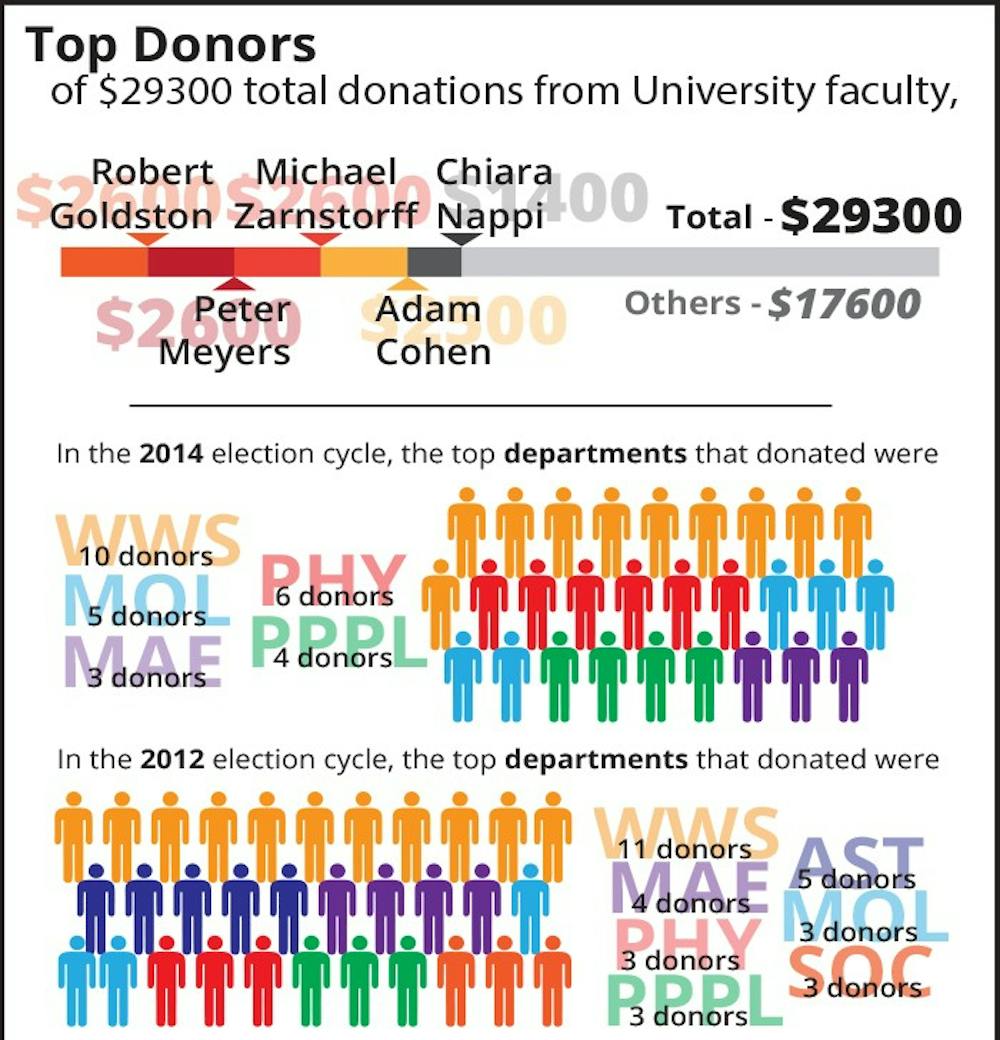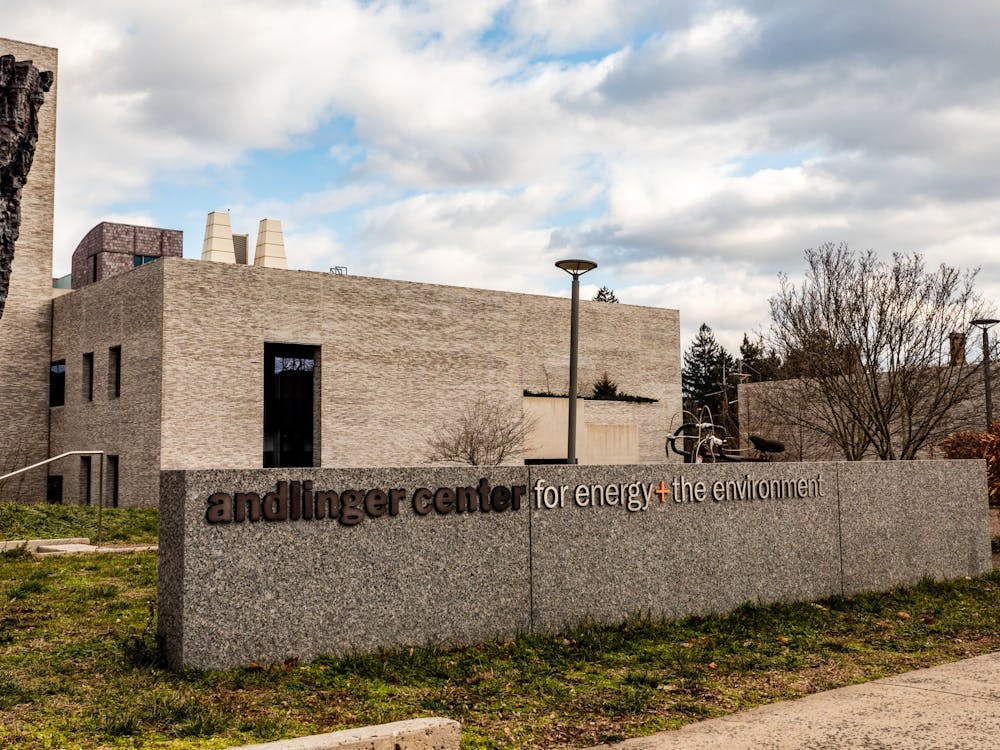“There is a bumper sticker that goes around Princeton that says ‘My Congressman is a rocket scientist’. I’ve always felt kind of proud to be able to say that we have someone representing us in Congress with Rush Holt’s intelligence and his scientific background,” former University President Shirley Tilghman said in a November interview, reflecting on Holt’s popularity among Princeton constituents.
Holt has represented New Jersey’s 12th congressional district in the U.S. House of Representatives for the last 15 years, but prior to his career in politics, he was a scientist. Science brought him to the Princeton area, where he served as assistant director of the Princeton Plasma Physics Laboratory from 1989 until his first successful run for Congress in 1998. Prior to his election and his time at the PPPL, Holt was an arms controls expert for the State Department.
In 2013, Holt ran in the special election to fill the U.S. senate seat of the late senator Frank Lautenberg. He lost the Democratic primary to Newark mayor Cory Booker in August, who went on to win the position. Despite the much larger support that Booker seemed to have over Holt, Holt continued to receive support from his constituents, including University employees.
Princeton University employees, including administrators and faculty, have consistently supported Holt throughout his political career. Records on Open Secrets reveal that in the 2012 campaign cycle alone, Holt’s campaign received $48,340 in donations from 54 University employees.
The current top five donors for the 2014 election cycle are astrophyiscal sciences professor Robert Goldston, physics professor Peter Meyers and PPPL Deputy Director for Research Michael Zarnstorff, who have donated $2,600 each, PPPL deputy director for operations Adam Cohen, who has donated $2,500, and physics professor Chiara Nappi, who has donated $1400.
Nappi declined to comment for this article.
The scientists’ choice for Congress
Some of Holt’s donors who have contributed to the 2012 and 2014 campaign cycles said they support the congressman because they believe his experience as a scientist allows him to understand the details behind many science-related issues and bring an informed perspective to other issues considered by Congress.
Holt has been involved in a number of science-related issues, such as energy, the environment and science education. He has been active in promoting research and innovation in the New Jersey area. Mechanical and aerospace engineering professor Richard Miles said that one particular region that Holt works with is Einstein's Alley, the region connecting Princeton and Rutgers along the Route 1 corridor.
One of the major reasons why Holt has continued to receive support from University-affiliated individuals is his support for things that are important to the campus community, such as research and education, Tilghman said.
“From my perspective, very importantly, he has been a tremendous supporter of the University,” Tilghman explained. “And his support is based on a deep understanding of the role that University research plays in the federal agenda and he has always been an advocate for more resources for science.”

In 2007, Tilghman said she co-hosted a meeting at Princeton for scientific leaders called the “Innovation Agenda.” Holt helped organize the meeting, and Tilghman credited Holt’s position in Washington with the ability to attract “important” people to the meeting.
She noted that the meeting played a role in the passage of the Creating Opportunities to Meaningfully Promote Excellence in Technology, Education, and Science, or COMPETES Act in 2007. The act mandated that the United States would invest in research and development.
“Without Rush, that meeting wouldn’t have happened, and without that meeting I don’t think we would have had the America COMPETES Act,” Tilghman said.
Fifteen Princeton faculty, mostly from the sciences, also endorsed Holt in August as the Democratic candidate for Lautenberg’s Senate seat.
“There are almost no members of the House that know anything about science, and many of the decisions that the House of Representatives has to make are related to science,” Miles said. “So I think it is critical to have somebody down there who at least understands many of the discussions that are going on and perhaps make contributions that will be valuable.”
Miles donated $700 in the 2012 cycle and so far has donated $550 in the current cycle.
Aside from an understanding of scientific theory, donors believed that Holt’s analytical skills allow him to think differently about other non-science issues.
“It’s just being technically literate allows him to go places that some politicians can’t, with not just confidence but some authority,” Meyers said, suggesting that things like electronic voting were non-science issues that still have a technological component.
Meyers has donated $2,600 so far to the 2014 election cycle.
“I’m not surprised that you find that scientists and people who are interested in science are interested in supporting me and my candidacies,” Holt said in a November interview.
Cohen said that Holt has been a “wonderful supporter and enthusiast” for fusion, the primary focus of research conducted at the PPPL. Holt has also helped enhance the international collaborative process of research, he said. Miles explained in his interview that Holt had helped one of their collaborators become a University faculty member by facilitating the visa process.
Cohen has donated $2,500 so far in the 2014 cycle.
Outside of the sciences, an appeal derived from liberal credentials
University employees across a range of departments said Holt’s scientific expertise is just one reason they support him, citing his liberal stances on a variety of policies that address topics as diverse as the widening income gap, federal support for foreign language acquisition, the National Endowment for the Humanities and the National Endowment for the Arts.
“I would describe him as generally a liberal Democrat who supports the kind of things that I’m interested in supporting,” Wilson School professor Stanley Katz noted.
Katz donated $1,250 in the 2012 election cycle and $500 in the current cycle.
History professor Hendrik Hartog, who has been friends with Holt since their days at Carleton College, said he also supported Holt for his stance on key issues.
“He has been a candidate who I respect and whose values I support and whose positions I support,” Hartog said.
Princeton University Investment Corporation President Andrew Golden, who donated $2,500 in the 2012 cycle and $1,000 so far in the 2014 cycle, said that he donates to Holt’s campaign because he recognizes that campaigns elections require money, and that Holt is “a candidate whose views [he] largely share[s].”
Even among those in the sciences, Holt’s stance on other issues remain influential in their support for the congressman.
“He’s a progressive candidate,” physics professor Daniel Marlow said. “Science is certainly part of it but it goes beyond that. He believes in limiting the government’s ability to listen to our phone calls, things like that.”
Marlow has donated $250 in the 2014 campaign cycle.
Knowing his base
Outside of his capacity as former Assistant Director at the PPPL, Holt has had the opportunity to meet many of his donors from the University in less formal settings.
Katz, for example, said he met Holt through a colleague in the Wilson School, while Miles said he met Holt through mutual colleagues while he was at PPPL. Golden said he met Holt at a fundraiser for stem cell research that was organized by Golden’s wife.
Nowadays, Holt said he returns to the University multiple times in a year, most recently in a visit to Terrace Club to meet with students and for a function at the Wilson School in early November. He said he also sometimes meets up with University employees in Washington, D.C. and in meetings on topics of interest locally. Zarnstorff said that he travels to Washington, D.C. for business and he meets with Holt once a year while he is there.
However, Holt noted that he does not focus exclusively on Princeton and visits other universities like TCNJ, Rider University and Rutgers University, which are all in his district.
Despite the support and interest that Holt receives from University employees, he said that most of his donors over his past campaigns have actually self-identified as retired.
“I’ve had a broader donor base than most members of Congress, certainly more than any other New Jersey member of Congress,” Holt said.
University donors are not surprised that Holt continued to receive support during his run in the special election for Senate against Booker. Holt lost the bid, but from donors’ perspective the race allowed him to share his stance on important issues with a wider audience.
“We knew and he knew that he couldn’t win, but he really wanted to make the run and wanted the platform to speak out on issues, and I was happy to support him to do that,” Katz said.
Cohen expressed a similar sentiment, noting the importance of campaign finance in an age where buying time on the air is expensive.
“I thought it was worthwhile to have an open debate, and one way to make sure that debate happens intelligently is to make sure that people like Rush are funded so they can run a campaign without having to be overrun with T.V. ads and other things,” Cohen said.









